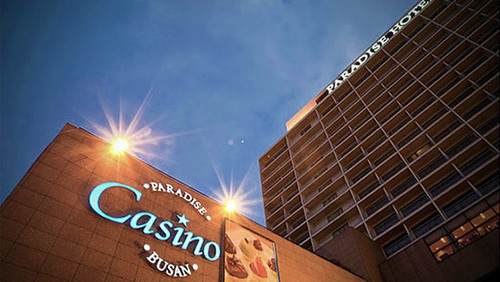Paradise Co., operator of the foreigners-only Paradise Casino in South Korea, saw its casino revenue dip slightly last month compared to November 2017. In a filing with the Korea Exchange, the company reported that its revenue fell 4.9%, settling at $373.2 million. For the same period last year, it had taken in $48.71 million.
 Table revenue for the month dropped to around $42.5 million, a 6.7% decline from the $45.59 million it reported in 2017. The table revenue decline was shored up by a growth in machine revenue, which saw an increase of 21.9% over November 2017. Last year, machine revenue was $3.11 million, whereas this year it came in at $3.79 million.
Table revenue for the month dropped to around $42.5 million, a 6.7% decline from the $45.59 million it reported in 2017. The table revenue decline was shored up by a growth in machine revenue, which saw an increase of 21.9% over November 2017. Last year, machine revenue was $3.11 million, whereas this year it came in at $3.79 million.
Paradise Co. didn’t offer any reason for the drop; however, it isn’t consistent with the rest of the year’s performance. Through October 2018, the aggregate casino revenue increased 16.6% year-on-year, reaching around $523.36 million. Its third-quarter performance saw the biggest gain, with its net income increasing 266% over the same period last year.
In the first 11 months of the year, the company’s table revenue increased 16.7%—to $488.44 million—compared to the same period last year. Machine revenue also climbed, increasing by 15.7%, $35.17 million, year-on-year. Table drop, which describes the amount of cash that customers exchange for chips at the table, increased 13.5% to $4.74 billion.
The results cover four venues controlled by Paradise Co. These include Paradise City in Incheon, Busan Casino in the port city of Busan, Jeju Grand on Jeju Island and Walkerhill, which is located in Seoul.
Paradise City has continuously given the company a boost. It opened its second phase this past September, which introduced a club, shopping mall and a spa to attract a more diverse market. It is currently working on Phase 3, which will include an indoor theme park, and expects it to be ready sometime during the first half of next year.
The goal of Paradise City is to create a family-friendly environment that doesn’t have at its center gambling operations. It is introducing a number of non-gaming entertainment solutions to attract more visitors and it’s too early to tell whether or not those efforts will pay off.